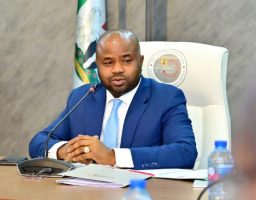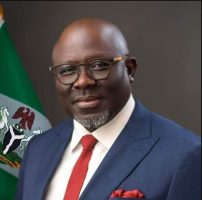A prosecution witness, Mr. Ajayi Michael Folaseye, on Monday told a Federal High Court in Lagos how he rejected a $7,000 bribe allegedly offered by a colleague seeking unauthorized access to Premium Trust Bank’s internal systems.
Ajayi, the first prosecution witness (PW1), testified before Justice Alexander Owoeye in the ongoing trial of Kehinde Odeyemi and Matthew Adeniyi Damilola, both employees of Premium Trust Bank.
They are being tried alongside three others, Samson Dakup, Bolaji Yinka, and Sunday Okunola, on a seven-count charge bordering on conspiracy to steal.
The case is being prosecuted by the Lagos Zonal Directorate 1 of the Economic and Financial Crimes Commission, EFCC.
Led in evidence by EFCC counsel, Rotimi Oyedepo, SAN, Ajayi, who works in the bank’s Information Technology (IT) department, testified that the first defendant, Kehinde Odeyemi, an internal auditor, made the offer during a covert conversation on May 5, 2023.
“She approached me during office hours and suggested we could make some money through a ‘side gig,” he said.
“She asked for a generic IP address used within the IT department.”
Ajayi explained that he told her no such generic IP existed and that he only had a personal IP address assigned for daily use.
Despite his refusal, Odeyemi allegedly offered him $5,000 in cash, promising delivery from the bank’s head office that evening.
When he declined again, she raised the offer to $7,000.
“I told her I wasn’t interested. She then told me to keep the conversation secret and threatened to resign if I reported it,” Ajayi told the court.
He said he immediately tried to report the incident to his supervisor, Mr. Kenneth Nwaeze.
When Nwaeze was unavailable, he escalated the matter to Mr. Idriss Adegoke and eventually to the bank’s Head of IT, Mr. Mike Koledoye.
According to Ajayi, Koledoye convened a meeting on May 6, 2023, with all parties involved, heard their accounts, and directed that appropriate security measures be taken.
READ ALSO: Oborevwori hails Anaba’s re-election as NGE President
A week later, on May 13, Ajayi and two other staff members were invited by the EFCC to make formal statements.
Ajayi further explained that the IP address Odeyemi requested was a sensitive access point to the bank’s servers and databases.
“It is a code that grants access to customer data and core banking operations. Disclosing it would pose serious cybersecurity risks,” he said.
He added that sharing such information would violate the bank’s data protection policy.
“My department is the backbone of the bank, we warehouse all transaction data. A breach could lead to cyber attacks or loss of customer trust.”
When asked why he chose to report the matter despite being urged to remain silent, Ajayi said, “Given past incidents, the bank mandates us to report any suspicious behaviour immediately. It could have been a trap or an integrity test.”
The prosecution sought to tender Ajayi’s written statement to the EFCC as evidence.
Although defence counsel objected, citing illegibility, Justice Owoeye admitted the document, stating that the issues raised were matters for cross-examination and not sufficient to render the document inadmissible.
Earlier proceedings, the first defendant’s counsel, Adeleke Adepoju, applied for an adjournment, citing inadequate access to prosecution materials for trial preparation.
He referred to Section 36(6) of the Constitution and Section 396 of the Administration of Criminal Justice Act, 2015.
Counsel for the second and fifth defendants, Olusola and A. Oliha respectively, also objected to the trial commencing, arguing that the proof of evidence was unclear and unreadable.
However, Oyedepo opposed the applications, arguing that the prosecution had served the documents since June 19.
READ ALSO: Lawyer in Trouble Over Lagos Monarch’s Removal
“If the defence had concerns, they should have informed us before today. Everyone agreed to this trial date,” he said, urging the court to proceed.
In a bench ruling, Justice Owoeye dismissed the applications and ordered the prosecution to proceed with its first witness. The matter was adjourned for further hearing to July 18, 2025.
The EFCC had on May 20, 2025, arraigned Odeyemi, Damilola, and three others before the Federal High Court in Ikoyi, Lagos, on a seven-count charge of conspiracy to steal.
According to the EFCC, the defendants conspired between April and May 2025 to manipulate Premium Trust Bank’s server and domain credentials in an attempt to access the bank’s database and steal funds.
“That you, Kehinde Odeyemi, Samson Dakup, Bolaji Yinka, Sunday Okunola, and Matthew Damilola, along with others now at large, including individuals identified as Humble, Wasiu, Isa Ismaila, and Victor Joshua Ilemona (a.k.a. Oracle), conspired to unlawfully manipulate the server access codes and domain credentials of Premium Trust Bank, to gain unauthorized access to its database and steal depositors’ funds, thereby committing an offence contrary to Sections 27 and 28(1)(b) of the Cybercrimes (Prohibition, Prevention, Etc.) Act, 2015 (as amended in 2024), punishable under Section 28(2) of the same Act.”






